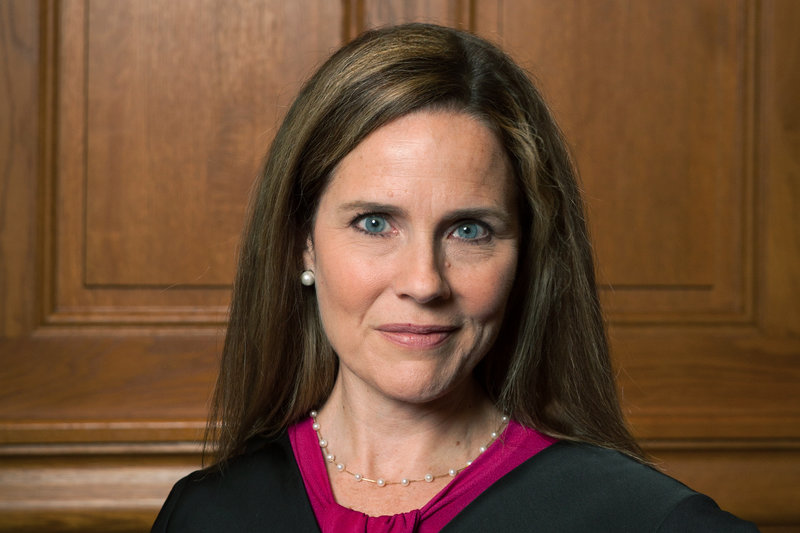
- Details
- By Levi Rickert
WASHINGTON — The U.S. Senate confirmed Amy Coney Barrett to the U.S. Supreme Court on Monday evening. The addition of Barrett, President Donald Trump’s nominee to fill the seat left vacant on the nation’s highest court when Justice Ruth Bader Ginsburg died on Sept. 18, caps off a swift push from Republicans and Trump to deliver a Senate approval just days before the presidential election and one that could impact the court for years to come.
The Senate confirmation came down mainly party lines with a vote of 52 to 48. All Democratic senators voted against Barrett. Only one Republican, Sen. Susan Collins (R-ME), opposed Barrett’s confirmation. Barrett becomes the first Supreme Court nominee since Edwin Stanton in 1869 to be confirmed without bipartisan support, according to the National Journal.
The confirmation came one month after Barrett was nominated by the president. It also is the only confirmation in the history of the United States to occur so close to a presidential election that is now underway and will end on Election Day eight days from now.
With her confirmation, Barrett is scheduled to be sworn in by Supreme Court Justice Clarence Thomas on Monday night. Once seated, Barrett will cement a 6-3 conservative majority on the court.
The confirmation is of concern to American Indians because one week after Election Day the Supreme Court will hear oral arguments in the Trump administration’s attempt to have the Affordable Care Act (ACA) invalidated, which will kill critical protections for those with pre-existing conditions.
The threat to the ACA is concerning to Indian Country beyond the pre-existing conditions provision. When it was enacted one decade ago, the ADA permanently reauthorized the Indian Health Care Improvement Act — a landmark victory for Indian Country, and one of the key authorizations for the Indian Health Service (IHS) — and expanded access to health care for American Indians and Alaska Natives through marketplace exchanges, Medicaid expansion, and increased revenue for the IHS.
The ACA has been a game changer for millions in Indian Country.
Taking away health care for millions of American Indians and Alaska Natives would be devastating to Indian Country, which has already suffered disproportionately during the Covid-19 pandemic.
Barrett’s rapid confirmation drew the ire of Sen. Tom Udall (D-N.M.), vice chairman of the Senate Committee on Indian Affairs.
“Republicans went back on their word that a Justice could not be confirmed eight months before an election, now installing a nominee eight days before election day, while Americans are casting their votes. It is no secret that Republicans’ hypocrisy is all in service of securing the necessary Supreme Court votes to dismantle the Affordable Care Act which would rip away health care from millions in the middle of a pandemic,” Udall said after Monday’s vote.
More Stories Like This
Native News Weekly (August 25, 2024): D.C. BriefsNative News Weekly (February 22, 2026): D.C. Briefs
NCAI Releases Sttatement on the Passing of Rev. Jesse Jackson
Colusa Indian Energy Participates in Port of Quincy Town Hall on Columbia Basin Power Project
Q&A: Jingle Dress Dancer Answered Call to Ceremony in Face of ICE Violence
Help us defend tribal sovereignty.
At Native News Online, our mission is rooted in telling the stories that strengthen sovereignty and uplift Indigenous voices — not just at year’s end, but every single day.
Because of your generosity last year, we were able to keep our reporters on the ground in tribal communities, at national gatherings and in the halls of Congress — covering the issues that matter most to Indian Country: sovereignty, culture, education, health and economic opportunity.
That support sustained us through a tough year in 2025. Now, as we look to the year ahead, we need your help right now to ensure warrior journalism remains strong — reporting that defends tribal sovereignty, amplifies Native truth, and holds power accountable.
 The stakes couldn't be higher. Your support keeps Native voices heard, Native stories told and Native sovereignty defended.
The stakes couldn't be higher. Your support keeps Native voices heard, Native stories told and Native sovereignty defended.
Stand with Warrior Journalism today.
Levi Rickert (Potawatomi), Editor & Publisher

